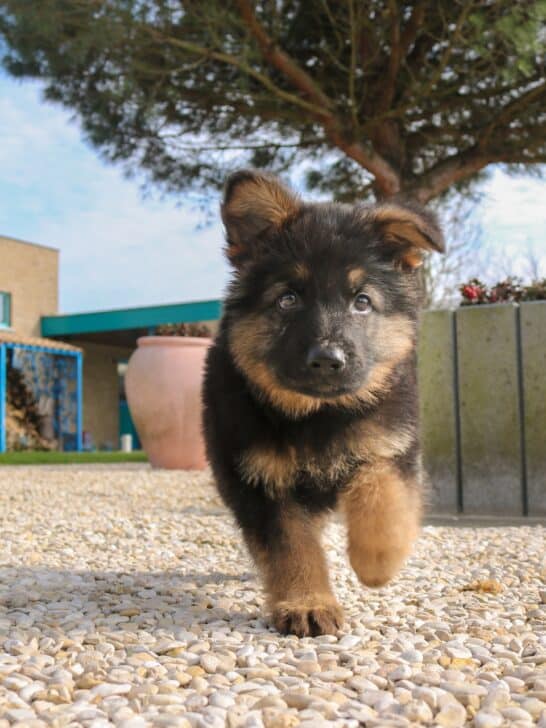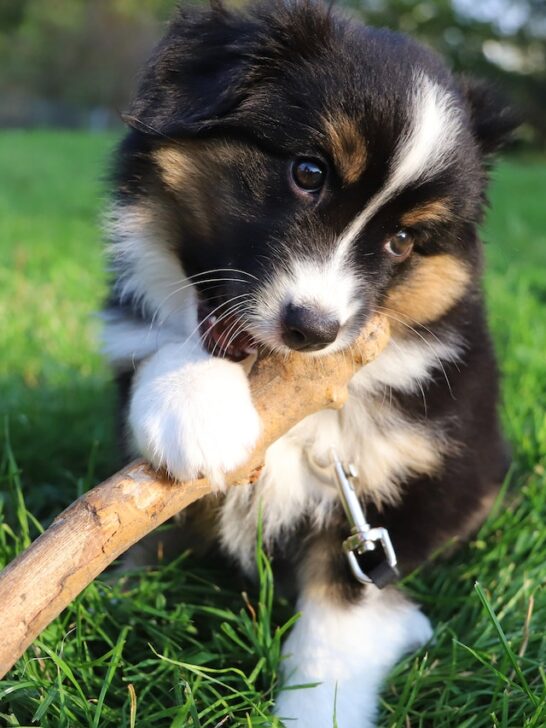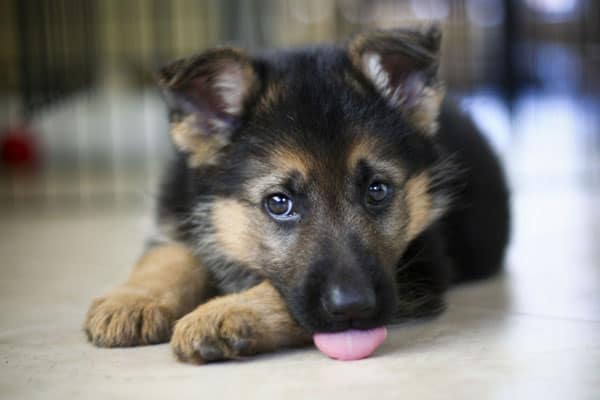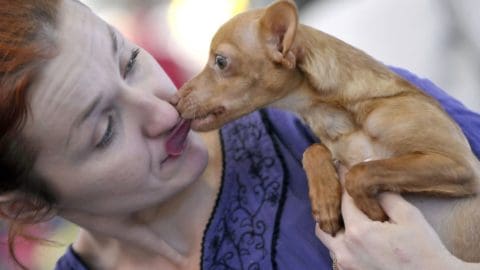How to Get German Shepherds to Calm Down: What to Do About an Over-Active GSD
German Shepherd dogs are incredibly loyal, brave, and loving. They can also be incredibly active and energetic, however.
Sometimes a new German Shepherd owner may feel like their dog will never get enough activity to settle down. Is there anything you can do to get your dog to calm down?
How to Get German Shepherds to Calm Down?
Getting a German Shepherd dog or puppy to calm down starts with understanding the temperament of the German Shepherd dog breed.
These are working dogs with a naturally high energy level and drive.
One key to calming your German Shepherd, then, is providing enough daily exercise, playtime, and – ideally – some type of sport or job to do.
There are other ways to help your dog stay calmer as well.
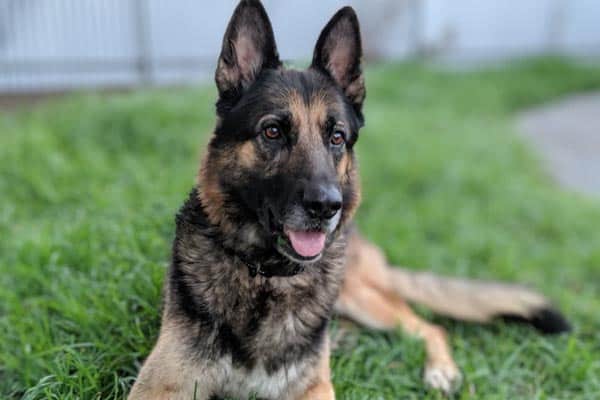
Watch an Expert GSD Trainer Teach a German Shepherd to Calm Down
Sometimes it can really help to watch how a professional dog trainer works with a dog to learn new behaviors.
This gives you a visual guide to how you can teach your dog to master the same types of skills.
This helpful YouTube video by a positive methods dog trainer walks you through how to train a German Shepherd to calm down on a mat or inside a kennel using clicker training,
As part of this method, they also use treats and playtime for rewards.
What Causes a German Shepherd Dog to Be So Energetic?
If you have never owned a German Shepherd or any working dog breed before now, you may legitimately be unaware of just how different a working dog’s temperament can be from a traditional “pet” dog breed.
This German Shepherd owner forum clearly highlights just how surprised some new, first-time GSD owners can be when their puppy keeps on growing up and the energy level stays at puppyhood level!
As the American Kennel Club (AKC) points out, German Shepherds come from the herding group of working dog breeds.
Herding dog breeds are accustomed to putting forth high energy output often for many hours at a stretch.
Their job duties include keeping a herd of livestock together and accounted for and defending the herd against predators.
German Shepherds have such intense energy drives precisely because herding isn’t a job that can wait for any length of time for a nap or snack break.
The dog always needs to be on high alert against stragglers or predators.
It is true that an older GSD may experience a natural slowdown due to advancing age.
But with German Shepherd puppies, you can expect them to exhibit the characteristic intense focus and drive to work that this breed is known for.
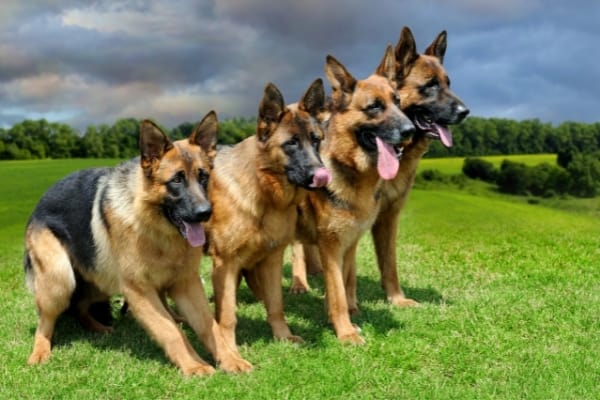
Great Jobs for Energetic German Shepherd Dogs to Do
As the California Golden State German Shepherd Rescue organization explains, there is no longer a great demand for herding and livestock guarding dogs.
While some ranchers still do employ dogs in this type of job, the vast majority of herding dogs are now in demand in other types of fields.
For the German Shepherd, the main types of jobs these dogs do today include the following:
- Police and personal protection duty.
- Guard dog and military dog duty.
- Search and rescue duty.
- Nose work and scent work.
- Hunting and tracking.
- Guide dog and service animal work.
Other great avenues to give your GSD an outlet to burn up that considerable daily drive and energy include these:
- Canine athletics such as dock diving, herding, agility.
- Schutzhund training (a perfect choice for German Shepherds).
- Obedience, Rally, and show dog competitions.
When Can German Shepherds Safely Start Competing in Sports or Going Jogging?
You can also simply involve your German Shepherd in your own athletic activities. If you lead an active lifestyle, your dog will enjoy accompanying you for sure.
However, here you need to keep in mind that, as a large dog breed, the German Shepherd dog can take longer to grow up and mature than a smaller dog breed will.
This means the growth plates in your dog’s bones may still be open and generating new bone growth. It can take up to 14 months or longer for these plates to close permanently.
Choosing to spay/neuter or involve your dog in intense athletics too early in life can cause a lot of damage.
It is important to talk with your dog’s veterinarian to determine when is the right time to allow your dog to go jogging, hiking, or even on long walks with you.
You will need to wait for a confirmation X-ray to know for sure that the growth plates are closed and it is safe to enroll your dog in vigorous sports or go on extended adventures with you.
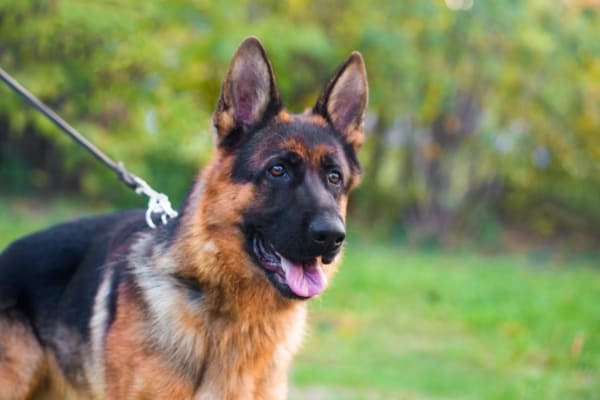
How to Help Your German Shepherd Puppy Stay Calm
Hearing that it may take up to 14 months for your GSD puppy to fully grow up may feel disheartening if you are coping with the all-go, no-stop activity level of the typical German Shepherd puppy!
As the American Kennel Club (AKC) points out, there are specific training programs that are designed for German Shepherd puppies.
The STAR program is one such program. STAR stands for Socialization, Training, Activity, Responsible Ownership.
STAR teaches both the GSD puppy and their owner how to manage the exuberance and energy levels of a German Shepherd puppy by setting up a daily activity and exercise schedule.
This is not to say you have to use this particular training program to achieve these results.
Instead, it is simply to suggest that, if the current schedule your GSD puppy is on is not providing the results you hope for, you can sit down and create a different activity and exercise schedule to see if your puppy naturally becomes calmer.
Sometimes there may also be environmental issues that are triggering excessive activity, crying, whimpering, barking, or other undesirable puppyhood behaviors.
Here are some of the most common triggers that may be causing your German Shepherd puppy to “act out” in ways not unlike how a human child might overreact!
Teething
Teething is very painful to go through no matter what the species.
If your German Shepherd puppy is going through teething, you can absolutely expect more chewing, play-biting, nipping, whining, crying, and demands for attention.
Giving your teething puppy ice pops or frozen chew toys can often help to ease the discomfort and also the behaviors.
Separation anxiety
Just as some dog breeds are more energetic and active by nature, so too can some dog breeds be more prone to developing separation anxiety.
German Shepherds fall into both categories. But the two conditions are not necessarily linked.
While having high energy is just a hallmark of the GSD breed, developing separation anxiety is more a function of putting a high-energy, high social-needs dog in a situation where there is not enough of either.
Sometimes abuse, re-homing, and other factors can also trigger separation anxiety.
For many years, separation anxiety in dogs was not well understood. Today, we do know that separation anxiety is potentially preventable and very treatable.
A German Shepherd of any age that develops separation anxiety is not just a dog that has “trouble calming down.” This is a GSD that is under extreme stress and needs a well-defined treatment plan.
But how can you know whether what you are experiencing with your German Shepherd is simply excess energy or separation anxiety?
Here are some tips from GSROC:
- The behaviors seem triggered when you leave and return.
- The behaviors only start to occur after a big change (a move, divorce, new job, etc).
- You see your German Shepherd pacing, panting, drooling, or exhibiting other behaviors that are closely correlated with separation anxiety in dogs.
- Your GSD whines, cries, barks, howls or makes other noises the moment you leave direct line-of-sight.
- While you are away, your dog is extremely destructive and may destroy household furnishings, eliminate inappropriately in the house, or try to escape repeatedly.
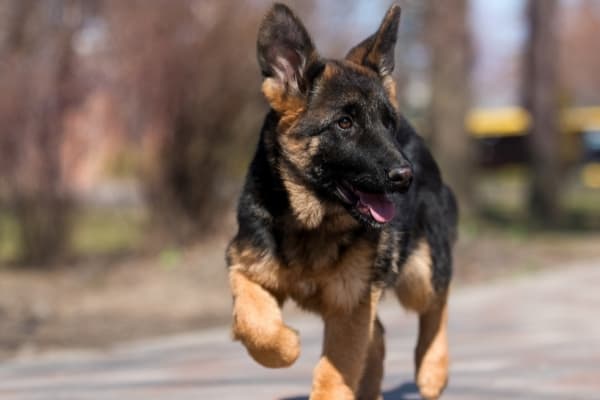
When Your German Shepherd Won’t Stay Calm Because of Health Issues
There may be times when all the training, behavioral reconditioning or teething aids in the world do not seem to successfully resolve your German Shepherd’s over-activity.
This is always the right time to consider whether there may be a medical health issue at the root of your dog’s behavior.
As the Mid-Atlantic German Shepherd Rescue organization points out, German Shepherds can develop any number of health conditions that may cause your dog to become (or remain) over-active.
Often, as with teething problems, your dog’s discomfort is at the root of hyperactive or destructive behavior patterns.
This is always the right time to take your dog to the veterinarian for a health checkup. In fact, sometimes it makes sense to do this first before you look at possible behavioral or boredom issues.
This way, you can at least rule out any underlying health issues that may be triggering inappropriate or destructive behaviors in your dog.
Here are examples of health conditions MAGSR gives that are known to plague German Shepherds that may cause your dog to act out:
Skin allergies
The itching and irritation of skin allergies can cause excessive scratching, licking, rubbing, and similar behaviors. Usually, these types of issues are controlled through diet changes or medication, or both.
Panosteitis (“growing pains”)
Panosteitis, or “pano” as it is sometimes called, can cause lingering random pains or lameness that moves about as your dog is growing. It often disappears on its own but a veterinary visit is always warranted.
Perianal fistulas
Perianal fistulas are every bit as uncomfortable for your dog as the name suggests.
The condition is suspected to be an immune system disruption but researchers still don’t fully understand it. It may be a sort of canine version of Crohn’s, which requires medication to treat.
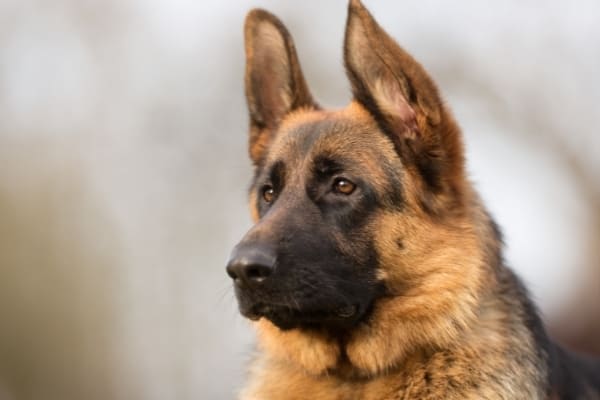
Look At Your Own Inner State to Help Your German Shepherd Calm Down
One potential remedy that may get your German Shepherd to calm down when nothing else has worked often surprises GSD owners – you may need to calm down first!
As Science Daily points out, there is now increasing research to suggest that dogs have evolved to closely mirror human emotions in every way.
Not only do modern dogs now have specialized eyebrow muscles that allow them to produce “puppy eyes,” but dogs can and do readily pick up on their owners’ stress levels and their stress may increase accordingly.
This can be a tougher challenge to track down. But it may help to start by keeping a journal on paper or on your phone, noting times when your dog becomes especially hyper and noticing how you are feeling during those times.
You may uncover a link between your own stress or anxiety and your dog’s acting out those feelings through their behaviors.
If this does end up applying in your situation, learning more about deep breathing, mindfulness meditation, yoga or tai chi and other relaxation aids can help both you and your German Shepherd calm down quickly and effectively.
Great At-Home Activities for Hyper German Shepherd Dogs
You may be reading through this article and thinking there is no way you have any extra time in your daily schedule to try all these things.
There is a lot you can do at home to add enrichment to your dog’s day. Snuffle feeding mats, treat balls, interactive puzzles, and games are all great ways to exercise your dog’s mind as well as their body.
Breaking up the day with short focused walks, treasure hunts, play sessions, or training sessions also gives your dog more to look forward to all day long.
In these ways, you can make small changes for big results to help your GSD calm down.
























